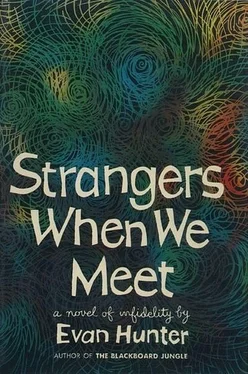“Who’s there?” she said.
“Me. Mrs. Garandi.”
“Oh, Signora,” she said, disappointed. “Just a moment.”
She unlocked the door. Mrs. Garandi, holding open the storm door, a shawl thrown over her shoulders, said, “Eve, are you busy? Why don’t you and Larry come over for some coffee? Arthur brought home a beautiful cake, and the three of us will never finish it alone.”
“Larry’s out,” Eve said. “Why don’t you come in a minute?”
“All right, but just for a minute.” She closed the door behind her. Together they walked into the living room. The Signora looked curiously at the television screen and then sat opposite Eve.
“Come over anyway,” she said. “It’s right across the street. You’ll be able to check on the kids.”
“I’ve got darning to do,” Eve said.
Mrs. Garandi nodded. Silently, she studied Eve. “Did Larry go to a lecture again?” she asked.
“No, not tonight. He’s with a client. He delivered some sketches this week, and they’re going to discuss them tonight.”
“I see.” Mrs. Garandi was silent again. “These lectures he goes to. Does he go alone?”
“Yes.”
“Where are they?”
“At Pratt.”
“Why don’t you go with him?”
“They’re for a architects, and pretty technical from what Larry tells me. Besides, it’s good for a man to get away from his wife once in a while, don’t you think?”
“No. A man doesn’t need to get away.”
“Not even once in a while?”
“Not even ever . You should go with him.”
“Someone’s got to stay with the children.”
“Get a sitter. And if the lectures don’t interest you, meet him afterward. Go for a coffee together.”
“Oh, that’s silly,” Eve said. “I trust him completely.”
“Then why do you bring up the question of trust?”
“Well, you seemed to be imply—”
“Trust is only a word, Eve. Man-made. The things men conveniently make can just as conveniently be destroyed.”
“I think it’s a lot more than a word, Signora,” Eve said.
Mrs. Garandi shrugged. “If my husband were alive, I wouldn’t let him go wandering alone.”
“Larry doesn’t go wan—”
“I wouldn’t let him go wandering,” Mrs. Garandi said firmly.
Eve stared at her levelly. “Larry’s not that kind of man,” she said.
“He’s a man. And a woman is a woman. And there’s no such thing as that kind of man or that kind of woman. There are stronger things than the meaningless words we can invent, Eve. Are you so invulnerable?”
“Me?” Eve laughed. “I’ve never even looked at another man.”
“I don’t believe that.”
“Oh, well, looked , yes. But I never once thought of—”
“Stop him from going to his lectures.”
“I can’t do that, Signora.”
“Why not?”
“Because I trust him,” Eve said simply. “If I stopped him going to Pratt, I’d have to stop him from going to the store for cigarettes. I’d have to begin distrusting him. And I don’t want that.”
“I would stop him.”
“No.” Eve shook her head. “Larry’s not a cheat.”
“Another word,” Mrs. Garandi said. “Who’s to say what and what isn’t? Who’s to say what’s cheating? A man is a man, and a woman is a woman. That’s life, and that’s living, and I wouldn’t let my man go off alone each week.”
“Larry is satisfied,” Eve said calmly.
“With everything? Or only with you?”
“I try to keep him happy.”
“Then keep him home. Keep him happier.”
“I do everything I know how to do. He is happy, Signora. Really he is. I don’t know why you think he isn’t.”
“Eve, carissima , I don’t think anything. I don’t know. But marriage is a funny thing in America, and the American wife has in many ways stopped being a woman.” Mrs. Garandi paused, and her eyes met Eve’s. “Forgive me,” she said. “I’m a foolish old woman. I only came to invite you for coffee.”
“That’s all right,” Eve said, smiling.
“Eve?”
“Yes?”
“Keep him home.”
And again Eve said, “I trust him,” and to this there was no answer.
“Will you come over later?”
“Maybe.”
“Not after eleven-thirty,” Mrs. Garandi said. “Arthur has to work tomorrow.”
“All right.”
“Do you think Larry will be home by then?”
“I don’t know. He’s with Roger Altar — his client. If he’s home, I’ll bring him over.”
“Please come.” Mrs. Garandi said, and she left the house. Eve closed the door behind her. She went back into the living room and picked up the sock she had been darning. A television comic was laughing at his own humour. The house felt very still and empty. In the bedroom, one of the children mumbled something in his sleep.
I trust him, Eve thought. I love him.
It was strange that she loved him so much now, she supposed, because she hadn’t even liked his looks that night so long ago at the Officers’ Club. She’d always preferred light-eyed boys. Even the ensign she’d been with was green-eyed. And then when Larry’d reminded her of their first encounter, she couldn’t look at him for the next five minutes without remembering again the shame she’d known that day on the subway. Even though she became convinced that she’d wrongly slapped him, he was nonetheless a reminder of what had been a terrible experience for her. She wanted to dislike him, and his looks supported her original premise. But she found herself succumbing to his warmth and honesty as they danced. Honesty. That, she supposed, was what had first appealed to her. He was honest. When he asked her out, she surprised herself by accepting. But she didn’t particularly care for his looks.
The Harder apartment, on the morning after their first date, was in the customary coma of its Sunday lethargy. The building was on the corner of Eighty-ninth Street and Fifth Avenue, opposite the park. The dining nook faced the side street, and the apartment was on the third floor, so that Sunday churchgoers could easily be seen from the window. Mr. Harder’s half of the table was covered with The New York Times . The twins had appropriated most of the remainder of the table for the Sunday comics. Cereal boxes, bowls, coffee, utensils, were somehow squeezed onto the table between the newspapers.
Mr. Harder staunchly believed that everyone in a family should eat at the same time. The table, he maintained, was an exchange board for the activities of the day, the one place where a family could catch up with itself. He relaxed his dictum only on Sunday mornings when everyone in the house seemed to drift into the dining nook at different hours. He imagined this had started when Eve began having Saturday-night dates. In any case, he felt that any regulation was strengthened by periodic lapses, and he did not mind the Sunday-morning disorder.
Mrs. Harder, wearing a dressing-gown over her nightgown, looking as fresh as she always did in the morning, said, “That boy was very handsome, Eve.”
Eve was still half asleep. She sat at the table in pajamas, and a strand of black hair hung over one eye. “You don’t really think so, do you, Mama?” she said.
“I certainly do,” Mrs. Harder said.
Mr. Harder, who was used to discussions about male strangers at the Sunday-morning breakfast table, put aside the Times , moved his platter of pancakes into a position of attack, and then looked across at Eve. He wanted to say something about her being a big girl now and wearing a robe to the breakfast table, but instead he said, “Who’s this we’re discussing?”
“Oh, a boy,” Eve said disinterestedly.
Читать дальше












